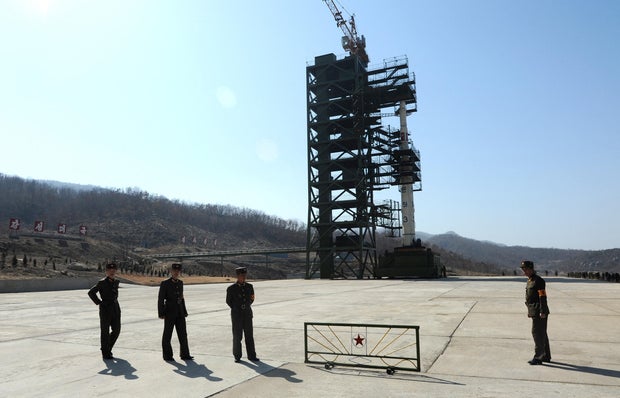Seoul, South Korea — North Korea announced plans to launch a rocket apparently carrying its second military spy satellite over an eight-day period starting Monday, drawing swift and sharp rebukes from neighbors South Korea and Japan.
Notification of the planned launch, prohibited by UN resolutions, came as South Korean President Yoon Suk Yeol and Japanese Prime Minister Fumio Kishida met Chinese Premier Li Qiang in Seoul to its first trilateral meeting in more than four years.
Japan’s coast guard said it was notified by North Korea about the planned launch of a “satellite rocket” with a warning of caution in the waters between the Korean Peninsula and China and east of the main Philippine island of Luzon from Monday until midnight on June 3.
North Korea provides Japan with launch information because Japan’s coast guard coordinates and distributes maritime security information in East Asia.
North Korea’s planned launch is thought to be an attempt to put its second military spy satellite into orbit. South Korea’s military said Friday it had detected signs of suspected preparations to launch a spy satellite from North Korea’s main launch site, Tongchangri, in the northwest.
The UN prohibits North Korea from carrying out any satellite launches, considering them a cover to test long-range missile technology. North Korea has firmly maintained that it has the right to launch satellites and test missiles. It says the spy satellites will allow it to better monitor the movements of the US and South Korea and increase the precision strike capabilities of its nuclear-capable missiles.
PEDRO UGARTE/AFP via Getty Images
“Any launch (by North Korea) using ballistic missile technology would directly violate UN Security Council resolutions and undermine the peace and security of the region and the world,” Yoon said at the start of the meeting with Kishida and Li. “ If North Korea proceeds with its launch despite international warning, I think the international community should deal with it severely.”
Kishida said he strongly urges North Korea to cancel the launch. China is an ally of North Korea and Li did not mention the North Korean satellite.
In phone conversations on Monday, senior diplomats from Japan, South Korea and the United States agreed to ask North Korea to abandon the launch. South Korea’s Unification Ministry, which deals with North Korea, separately called the North’s satellite launch “a provocation that seriously threatens our and regional security.”
Later on Monday, South Korea deployed 20 fighter jets for an exercise designed to demonstrate its determination to punish North Korea in the event of provocation, according to the South Korean military. Japanese officials said their missile interceptors remain ready to shoot down any debris from a North Korean rocket if it lands in Japanese territory.
Last November, North Korea sent its first military reconnaissance satellite into orbit as part of efforts to build a space-based surveillance network to deal with what it calls growing U.S.-led military threats. North Korean leader Kim Jong Un later told a ruling party meeting that the country would launch three additional military spy satellites in 2024.
It is widely questionable whether North Korean satellites can produce militarily significant images, but some civilian experts say operating multiple satellites could help North Korea continuously monitor large enemy targets.
The latest launch notification to Japan identifies the same danger zones for potential rocket debris as those identified before North Korea’s latest launch. That suggests North Korea would use the same first and second stage rockets as before, said Chang Young-keun, a missile expert at the Seoul-based Korea Research Institute for National Strategy.
Chang said launching three satellites this year would allow North Korea to image sites in South Korea, Japan and the U.S. Pacific territory of Guam more frequently.
Since 2022, North Korea has been engaged in a provocative series of missile tests to modernize and expand its weapons arsenal, prompting the US, South Korea and Japan to strengthen their security partnership in response. Experts say North Korea likely believes an expanded weapons arsenal would increase its influence in future diplomacy with the United States.
bol co
jogo de terror online
novela sbt ao vivo
wishlist
musica terra seca
taça png























